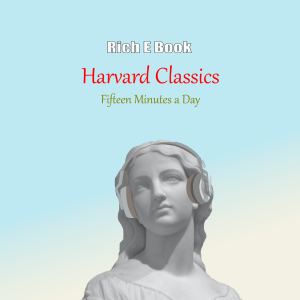
279.5K
Downloads
736
Episodes
Former President of Harvard University Charles W. Eliot wrote in his introduction to the Harvard Classics, "In my opinion, a five-foot shelf would hold books enough to give a liberal education to any one who would read them with devotion, even if he could spare but fifteen minutes a day for reading." Here you are, you can easily listen to his entire 15-minutes-a-day study guide while commuting to and from work (most of us spend far more than 15 minutes a day commuting each day), doing mundane work in the office, washing dishes at home, or doing most of the things day in and day out. It is so easy, so entertaining, and so educational that they can be listened to again and again, until they permeate into our own thinking and into our characters. Perhaps, in one year's time, you will become someone you barely recognize, all for the better. Who knows?
-- Rich E Book
Former President of Harvard University Charles W. Eliot wrote in his introduction to the Harvard Classics, "In my opinion, a five-foot shelf would hold books enough to give a liberal education to any one who would read them with devotion, even if he could spare but fifteen minutes a day for reading." Here you are, you can easily listen to his entire 15-minutes-a-day study guide while commuting to and from work (most of us spend far more than 15 minutes a day commuting each day), doing mundane work in the office, washing dishes at home, or doing most of the things day in and day out. It is so easy, so entertaining, and so educational that they can be listened to again and again, until they permeate into our own thinking and into our characters. Perhaps, in one year's time, you will become someone you barely recognize, all for the better. Who knows?
-- Rich E Book
Episodes

Thursday Jan 20, 2022
Introductory Note: John Keats
Thursday Jan 20, 2022
Thursday Jan 20, 2022
Introductory note on John Keats (The Ridpath Library of Universal Literature)

Thursday Jan 20, 2022
The Eve of St. Agnes, by John Keats
Thursday Jan 20, 2022
Thursday Jan 20, 2022
At midnight on the eve of St. Agnes there were certain solemn ceremonies which all virgins must perform to have "visions of delight and soft adorings from their loves." Porphyro took advantage of this custom to win his bride. (Volume 41, Harvard Classics)
St. Agnes' Eve, Jan. 20.

Wednesday Jan 19, 2022
Introductory Note: Edgar Allan Poe
Wednesday Jan 19, 2022
Wednesday Jan 19, 2022
Introductory note on Edgar Allan Poe (Volume 28, Harvard Classics)

Wednesday Jan 19, 2022
The Poetic Principle, by Edgar Allan Poe
Wednesday Jan 19, 2022
Wednesday Jan 19, 2022
Regarded in Europe as one of America's greatest writers, Poe originated the detective story, perfected the mystery short story, and produced America’s first great poems. Here he unravels the fabric of which all poetry is woven. (Volume 28, Harvard Classics)
Edgar Allan Poe born Jan. 19, 1809.

Tuesday Jan 18, 2022
Introductory Note: Aristophanes
Tuesday Jan 18, 2022
Tuesday Jan 18, 2022
Introductory note on Aristophanes (Volume 8, Harvard Classics)

Tuesday Jan 18, 2022
The Frogs, by Aristophanes
Tuesday Jan 18, 2022
Tuesday Jan 18, 2022
"Shall I crack any of those old jokes, master, at which the audience never fails to laugh?" Like an up-to-date vaudeville team, Xanthias and Dionysus start off a dialogue that mingles wit and poetry with humor and keen satire. (Volume 8, Harvard Classics)

Monday Jan 17, 2022
Introductory Note: Benjamin Franklin
Monday Jan 17, 2022
Monday Jan 17, 2022
Introductory note on Benjamin Franklin (Volume 1, Harvard Classics)

Monday Jan 17, 2022
The Autobiography of Benjamin Franklin (Ch. 1), by Benjamin Franklin
Monday Jan 17, 2022
Monday Jan 17, 2022
Good middle-class people, Franklin boasts, were his ancestors. Some have attributed his genius to his being the youngest son of the youngest son for five generations. In his famous autobiography, he reveals quaint family history. (Volume 1, Harvard Classics)
Benjamin Franklin born Jan. 17, 1706.

Sunday Jan 16, 2022
Introductory Note: Æsop’s Fables
Sunday Jan 16, 2022
Sunday Jan 16, 2022
Introductory note on Æsop’s Fables (Volume 17, Harvard Classics)

Sunday Jan 16, 2022
Æsop’s Fables, by Æsop
Sunday Jan 16, 2022
Sunday Jan 16, 2022
An old woman once found a wine jar, but it was empty. She sniffed at the mouth of the jar and said: "What memories cling 'round the instruments of our pleasure." (Volume 17, Harvard Classics)
